The AMD Ryzen Threadripper 3960X and 3970X Review: 24 and 32 Cores on 7nm
by Dr. Ian Cutress, Andrei Frumusanu & Gavin Bonshor on November 25, 2019 9:05 AM ESTCPU Performance: Web and Legacy Tests
While more the focus of low-end and small form factor systems, web-based benchmarks are notoriously difficult to standardize. Modern web browsers are frequently updated, with no recourse to disable those updates, and as such there is difficulty in keeping a common platform. The fast paced nature of browser development means that version numbers (and performance) can change from week to week. Despite this, web tests are often a good measure of user experience: a lot of what most office work is today revolves around web applications, particularly email and office apps, but also interfaces and development environments. Our web tests include some of the industry standard tests, as well as a few popular but older tests.
We have also included our legacy benchmarks in this section, representing a stack of older code for popular benchmarks.
All of our benchmark results can also be found in our benchmark engine, Bench.
Speedometer 2: JavaScript Frameworks
Our newest web test is Speedometer 2, which is a accrued test over a series of javascript frameworks to do three simple things: built a list, enable each item in the list, and remove the list. All the frameworks implement the same visual cues, but obviously apply them from different coding angles.
Our test goes through the list of frameworks, and produces a final score indicative of ‘rpm’, one of the benchmarks internal metrics. We report this final score.
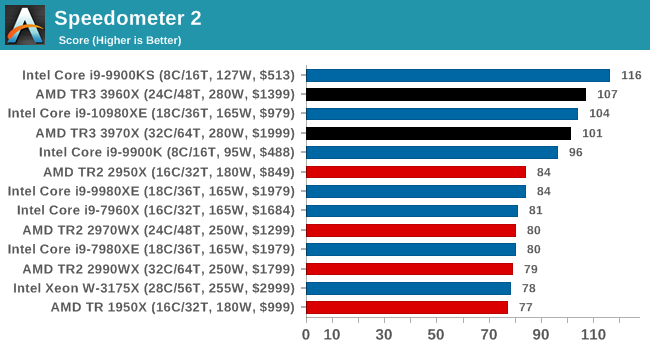
Google Octane 2.0: Core Web Compute
A popular web test for several years, but now no longer being updated, is Octane, developed by Google. Version 2.0 of the test performs the best part of two-dozen compute related tasks, such as regular expressions, cryptography, ray tracing, emulation, and Navier-Stokes physics calculations.
The test gives each sub-test a score and produces a geometric mean of the set as a final result. We run the full benchmark four times, and average the final results.
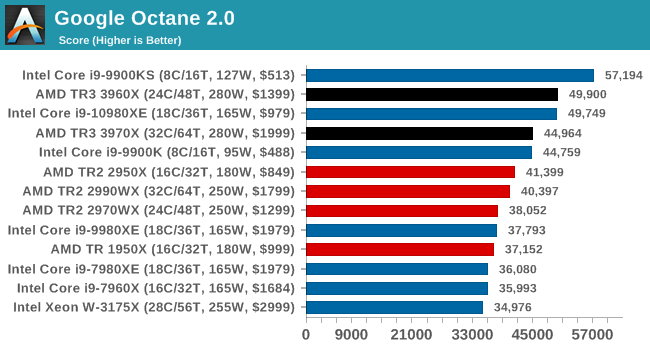
Mozilla Kraken 1.1: Core Web Compute
Even older than Octane is Kraken, this time developed by Mozilla. This is an older test that does similar computational mechanics, such as audio processing or image filtering. Kraken seems to produce a highly variable result depending on the browser version, as it is a test that is keenly optimized for.
The main benchmark runs through each of the sub-tests ten times and produces an average time to completion for each loop, given in milliseconds. We run the full benchmark four times and take an average of the time taken.
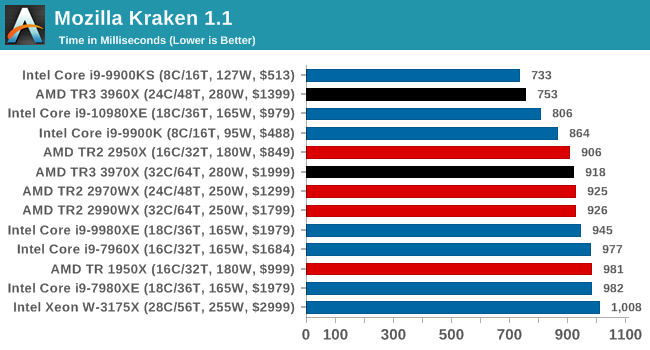
3DPM v1: Naïve Code Variant of 3DPM v2.1
The first legacy test in the suite is the first version of our 3DPM benchmark. This is the ultimate naïve version of the code, as if it was written by scientist with no knowledge of how computer hardware, compilers, or optimization works (which in fact, it was at the start). This represents a large body of scientific simulation out in the wild, where getting the answer is more important than it being fast (getting a result in 4 days is acceptable if it’s correct, rather than sending someone away for a year to learn to code and getting the result in 5 minutes).
In this version, the only real optimization was in the compiler flags (-O2, -fp:fast), compiling it in release mode, and enabling OpenMP in the main compute loops. The loops were not configured for function size, and one of the key slowdowns is false sharing in the cache. It also has long dependency chains based on the random number generation, which leads to relatively poor performance on specific compute microarchitectures.
3DPM v1 can be downloaded with our 3DPM v2 code here: 3DPMv2.1.rar (13.0 MB)
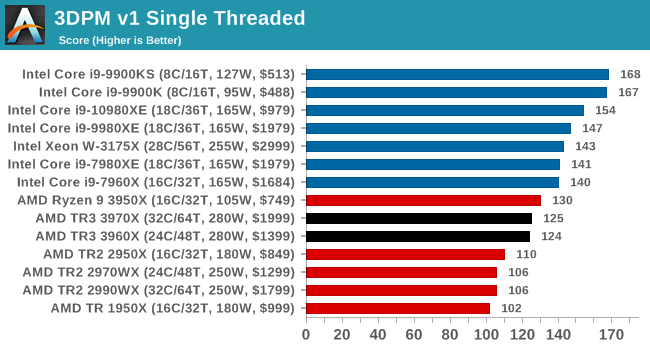
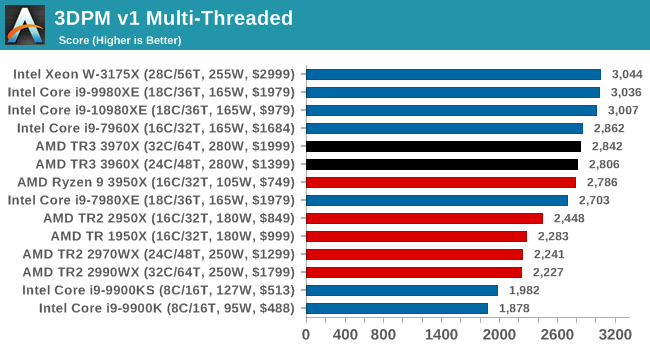
x264 HD 3.0: Older Transcode Test
This transcoding test is super old, and was used by Anand back in the day of Pentium 4 and Athlon II processors. Here a standardized 720p video is transcoded with a two-pass conversion, with the benchmark showing the frames-per-second of each pass. This benchmark is single-threaded, and between some micro-architectures we seem to actually hit an instructions-per-clock wall.
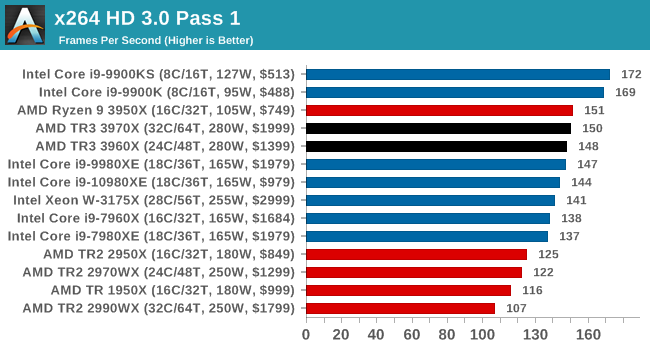
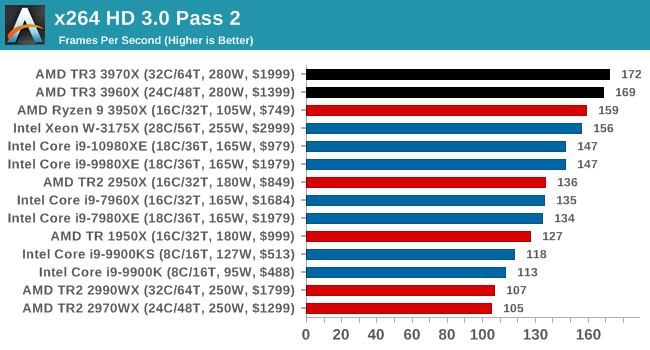
GeekBench4: Synthetics
A common tool for cross-platform testing between mobile, PC, and Mac, GeekBench 4 is an ultimate exercise in synthetic testing across a range of algorithms looking for peak throughput. Tests include encryption, compression, fast Fourier transform, memory operations, n-body physics, matrix operations, histogram manipulation, and HTML parsing.
I’m including this test due to popular demand, although the results do come across as overly synthetic, and a lot of users often put a lot of weight behind the test due to the fact that it is compiled across different platforms (although with different compilers).
We record the main subtest scores (Crypto, Integer, Floating Point, Memory) in our benchmark database, but for the review we post the overall single and multi-threaded results.
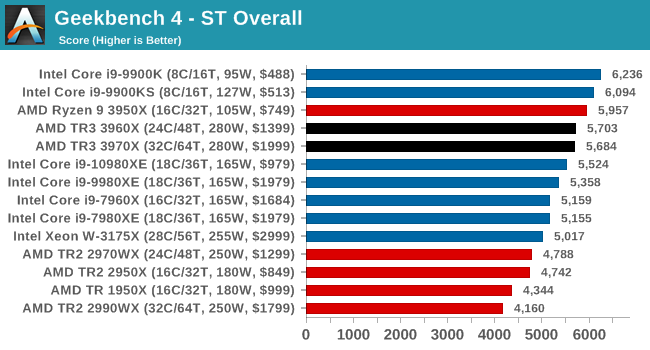
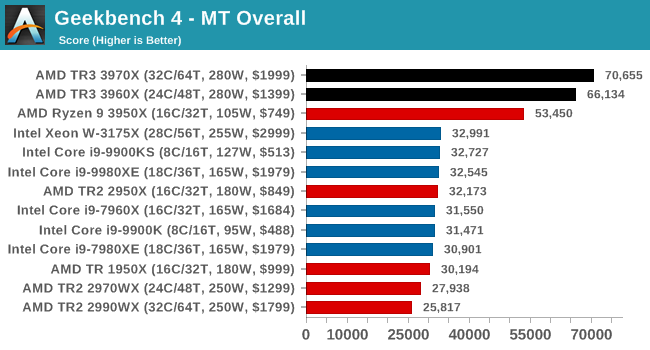










245 Comments
View All Comments
plonk420 - Monday, November 25, 2019 - link
it may be small, but they're now fighting Intel in that same small market with these Threadrippers, and, well AMD has the winning product in use cases i'm looking at (simultaneous video encoding streams and Blender, with enough cores to do that while gaming).AV1 is currently so slow to encode, i have to split a movie into 8 parts (probably more with one of these Zen2 TRs to get it done quicker) for a doable encode. took about 41-48 hours per part save for the credits to encode at 720p on a 16c32t 1950X
DavyJones - Monday, November 25, 2019 - link
AMD curbstomps Intel at every price point, from $50 all the way to $7000+. How much lower should AMD price their CPU's exactly? Should they give them away for free?And yes, Intel has a vastly larger marketshare. They were on top for well over a decade, & for a large portion of that, AMD was completely irrelevant. Their server marketshare was statistically insignificant just 3 years ago & now they're knocking on the door of 10%. Their stock has skyrocketed in that time. Again... How cheap should AMD go when they have an objectively superior product?
jabber - Tuesday, November 26, 2019 - link
Indeed at the end of the day Dell and HP etc. are taking all the i3/i5 chips the Corporate market can buy.Intel are probably still outselling AMD 10 to 1?
maxxbot - Tuesday, November 26, 2019 - link
I would absolutely bet that more of these TR3 are going to be sold to professionals than consumers, I waited in line for the 3950X yesterday and even for that part half of the people in line were buying it for work.Teckk - Monday, November 25, 2019 - link
In this segment could be, but in laptops Intel is what is selling. AMD needs Zen2 + 7nm thereTEAMSWITCHER - Monday, November 25, 2019 - link
That's my issue... I can't find any of these Threadripper, Ryzen 3950X, or Cascade Lake X in stock anywhere. But I can order 16" MacBook Pro right now and have it here tomorrow. Desktop CPU's are OLD SCHOOL. I would rather have a mobile solution that I can take .. anywhere.Korguz - Monday, November 25, 2019 - link
must be just where you are.. i can go to one store and buy the Threadripper 3960X now, but the 3970x is special order, for the intel 10xx series, not showing anything for these, yetimaheadcase - Monday, November 25, 2019 - link
Did Csutcliff not even look at benchmarks or even look at price difference for a setup?tygrus - Tuesday, November 26, 2019 - link
News of Intel's death have been greatly exaggerated. It would take more than 20 years of bad performance (<20% market share) for Intel to burn it's cash reserves.Oliseo - Tuesday, November 26, 2019 - link
I've seen bigger companies fail faster.